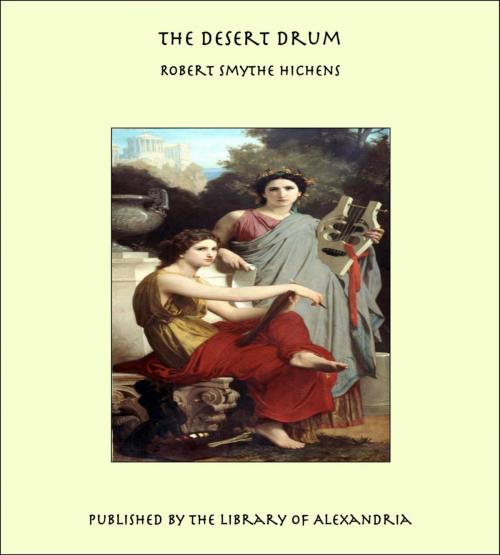| Author: | Robert Smythe Hichens | ISBN: | 9781465551238 |
| Publisher: | Library of Alexandria | Publication: | March 8, 2015 |
| Imprint: | Language: | English |
| Author: | Robert Smythe Hichens |
| ISBN: | 9781465551238 |
| Publisher: | Library of Alexandria |
| Publication: | March 8, 2015 |
| Imprint: | |
| Language: | English |
I am not naturally superstitious. The Saharaman is. He has many strange beliefs. When one is at close quarters with him, sees him day by day in his home, the great desert, listens to his dramatic tales of desert lights, visions, sounds, one's common-sense is apt to be shaken on its throne. Perhaps it is the influence of the solitude and the wide spaces, of those far horizons of the Sahara where the blue deepens along the edge of the world, that turns even a European mind to an Eastern credulity. Who can tell? The truth is that in the Sahara one can believe what one cannot believe in London. And sometimes circumstances—chance if you like to call it so—steps in, and seems to say, "Your belief is well founded." On an evening of spring, accompanied by a young Arab and a negro, I rode slowly down a low hill of the Sahara, and saw in the sandy cup at my feet the tiny collection of hovels called Sidi-Massarli. I had been in the saddle since dawn, riding over desolate tracks in the heart of the desert. I was hungry, tired, and felt almost like a man hypnotised. The strong air, the clear sky, the everlasting flats devoid of vegetation, empty of humanity, the monotonous motion of my slowly cantering horse—all these things combined to dull my brain and to throw me into a peculiar condition akin to the condition of a man in a trance. At Sidi-Massarli I was to pass the night. I drew rein and looked down on it with lack-lustre eyes. I saw a small group of palm-trees, guarded by a low wall of baked brown earth, in which were embedded many white bones of dead camels. Bleached, grinning heads of camels hung from more than one of the trees, with strings of red pepper and round stones. Beyond the wall of this palm garden, at whose foot was a furrow full of stagnant brownish-yellow water, lay a handful of wretched earthen hovels, with flat roofs of palmwood and low wooden doors. To be exact, I think there were five of them. The Bordj, or Travellers' House, at which I was to be accommodated for the night, stood alone near a tiny source at the edge of a large sand dune, and was a small, earth-coloured building with a pink tiled roof, minute arched windows, and an open stable for the horses and mules. All round the desert rose in humps of sand, melting into stony ground where the saltpetre lay like snow on a wintry world. There were but few signs of life in this place; some stockings drying on the wall of a ruined Arab café, some kids frisking by a heap of sacks, a few pigeons circling about a low square watch-tower, a black donkey brooding on a dust heap. There were some signs of death; carcasses of camels stretched here and there in frantic and fantastic postures, some bleached and smooth, others red and horribly odorous. The wind blew round this hospitable township of the Sahara, and the yellow light of evening began to glow above it. It seemed to me at that moment the dreariest place in the dreariest dream man had ever had. Suddenly my horse neighed loudly. Beyond the village, on the opposite hill, a white Arab charger caracoled, a red cloak gleamed. another traveller was coming in to his night's rest, and he was a Spahi. I could almost fancy I heard the jingle of his spurs and accoutrements, the creaking of his tall red boots against his high peaked saddle. As he rode down towards the Bordj—by this time, I, too, was on my way—I saw that a long cord hung from his saddle-bow, and that at the end of this cord was a man, trotting heavily in the heavy sand like a creature dogged and weary. We came in to Sidi-Massarli simultaneously, and pulled up at the same moment before the arched door of the Bordj, from which glided a one-eyed swarthy Arab, staring fixedly at me. This was the official keeper of the house. In one hand he held the huge door key, and as I swung myself heavily on the ground I heard him, in Arabic, asking my Arab attendant, D'oud, who I was and where I hailed from
I am not naturally superstitious. The Saharaman is. He has many strange beliefs. When one is at close quarters with him, sees him day by day in his home, the great desert, listens to his dramatic tales of desert lights, visions, sounds, one's common-sense is apt to be shaken on its throne. Perhaps it is the influence of the solitude and the wide spaces, of those far horizons of the Sahara where the blue deepens along the edge of the world, that turns even a European mind to an Eastern credulity. Who can tell? The truth is that in the Sahara one can believe what one cannot believe in London. And sometimes circumstances—chance if you like to call it so—steps in, and seems to say, "Your belief is well founded." On an evening of spring, accompanied by a young Arab and a negro, I rode slowly down a low hill of the Sahara, and saw in the sandy cup at my feet the tiny collection of hovels called Sidi-Massarli. I had been in the saddle since dawn, riding over desolate tracks in the heart of the desert. I was hungry, tired, and felt almost like a man hypnotised. The strong air, the clear sky, the everlasting flats devoid of vegetation, empty of humanity, the monotonous motion of my slowly cantering horse—all these things combined to dull my brain and to throw me into a peculiar condition akin to the condition of a man in a trance. At Sidi-Massarli I was to pass the night. I drew rein and looked down on it with lack-lustre eyes. I saw a small group of palm-trees, guarded by a low wall of baked brown earth, in which were embedded many white bones of dead camels. Bleached, grinning heads of camels hung from more than one of the trees, with strings of red pepper and round stones. Beyond the wall of this palm garden, at whose foot was a furrow full of stagnant brownish-yellow water, lay a handful of wretched earthen hovels, with flat roofs of palmwood and low wooden doors. To be exact, I think there were five of them. The Bordj, or Travellers' House, at which I was to be accommodated for the night, stood alone near a tiny source at the edge of a large sand dune, and was a small, earth-coloured building with a pink tiled roof, minute arched windows, and an open stable for the horses and mules. All round the desert rose in humps of sand, melting into stony ground where the saltpetre lay like snow on a wintry world. There were but few signs of life in this place; some stockings drying on the wall of a ruined Arab café, some kids frisking by a heap of sacks, a few pigeons circling about a low square watch-tower, a black donkey brooding on a dust heap. There were some signs of death; carcasses of camels stretched here and there in frantic and fantastic postures, some bleached and smooth, others red and horribly odorous. The wind blew round this hospitable township of the Sahara, and the yellow light of evening began to glow above it. It seemed to me at that moment the dreariest place in the dreariest dream man had ever had. Suddenly my horse neighed loudly. Beyond the village, on the opposite hill, a white Arab charger caracoled, a red cloak gleamed. another traveller was coming in to his night's rest, and he was a Spahi. I could almost fancy I heard the jingle of his spurs and accoutrements, the creaking of his tall red boots against his high peaked saddle. As he rode down towards the Bordj—by this time, I, too, was on my way—I saw that a long cord hung from his saddle-bow, and that at the end of this cord was a man, trotting heavily in the heavy sand like a creature dogged and weary. We came in to Sidi-Massarli simultaneously, and pulled up at the same moment before the arched door of the Bordj, from which glided a one-eyed swarthy Arab, staring fixedly at me. This was the official keeper of the house. In one hand he held the huge door key, and as I swung myself heavily on the ground I heard him, in Arabic, asking my Arab attendant, D'oud, who I was and where I hailed from















